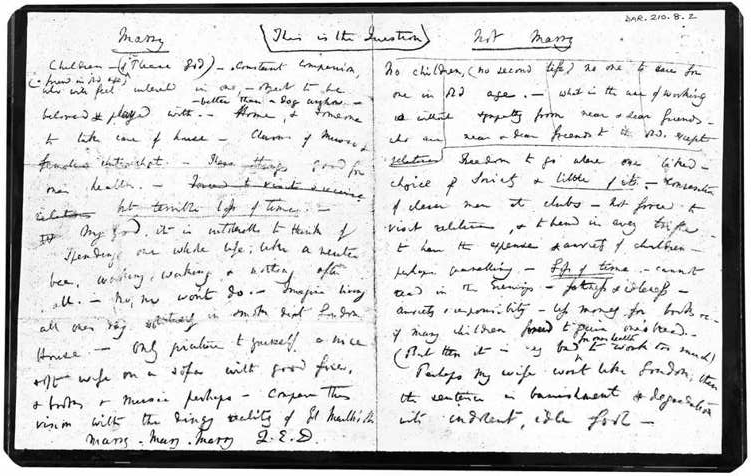When the all famous Charles Darwin couldn’t decide on whether or not to marry his cousin, Emma Wedgwood, he went and weighted every possible consequence.
His list went as the following:
In Favor, Pros:
- Children
- Companionship
- Charms of music
- Female chit-chat
Against, Cons:
Terrible loss of time- Lack of freedom to go where he wished
- The burden of visiting relatives
- The expense and anxiety provoked by children
- “Perhaps my wife won’t like London”
- Having less money to spend on books
Although the weight of the cons was much bigger, at the end of the paper, Darwin wrote: “Marry,
The problem
The decisions we make in life are a kind of prediction. For example, how much we’ll like something that we’ve never tried yet. Every prediction consists of thinking about two different things: What we know and what we don’t. So this is our attempt to formulate a theory that will take into consideration the experiences we’ve had from one part, and a guess about the future from another.
Most of our stubborn issues involve overthinking. How early should we stop thinking about it depends really on the gap between what can we measure and what really matters! If we have all the facts, free of all uncertainty, and we can directly assess whatever is important, then don’t stop early. Think long and hard: the complexity and effort are appropriate.
But that’s almost never the case. If we have high uncertainty and limited data, then we should stop early by all means. If we don’t have a clear read on how our work will be evaluated, and by whom, then it’s not worth the extra time to make it perfect with respect to our own guess at what perfection might be. The greater the uncertainty, the bigger the gap between what we can measure and what matters, the more we should watch out for overthinking. The more you prefer simplicity, and the earlier you should stop.
To return to Darwin, his problem of deciding whether to propose could probably have been resolved based on just the first few pros and cons he identified, with the subsequent ones adding to the time and anxiety expended on the decision without necessarily aiding its resolution (and in all likelihood impeding it). What seemed to make up his mind was the thought that “it is intolerable to think of spending one’s whole life like a neuter bee, working, working, & nothing after all.” Children and companionship—the very first points he mentioned—were precisely those that ultimately swayed him in favor of marriage.
His mind made up to marry, Darwin immediately went on to overthink the timing. “When? Soon or Late,” he wrote above another list of pros and cons, considering everything from happiness to expenses to “awkwardness” to his long-standing desire to travel in a hot air balloon and/or to Wales. But by the end of the page he resolved to “Never mind, trust to chance”—and the result, within several months’ time, was a proposal to Emma Wedgwood, the start of a fulfilling partnership and a happy family life.
